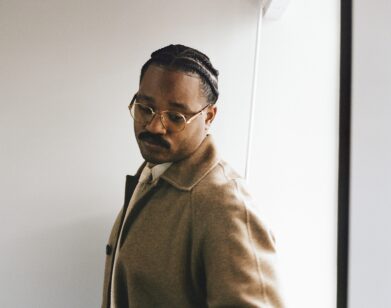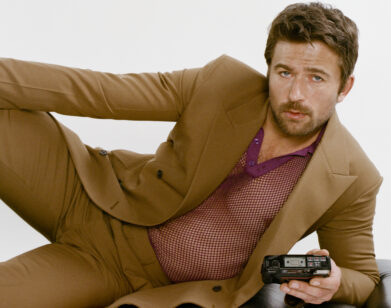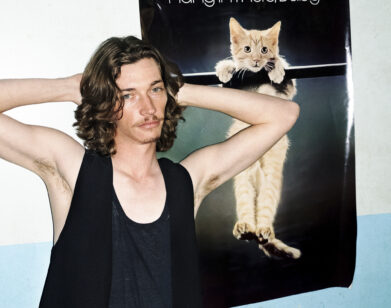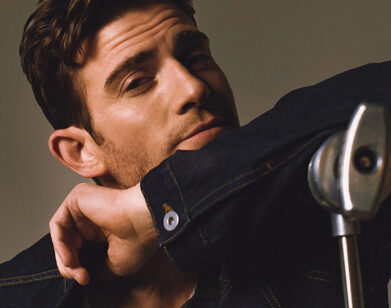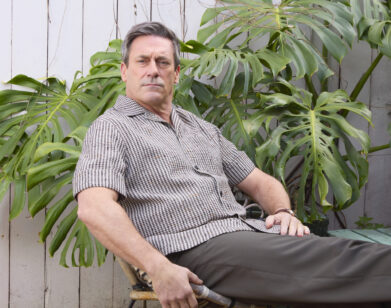New Again: Cate Blanchett
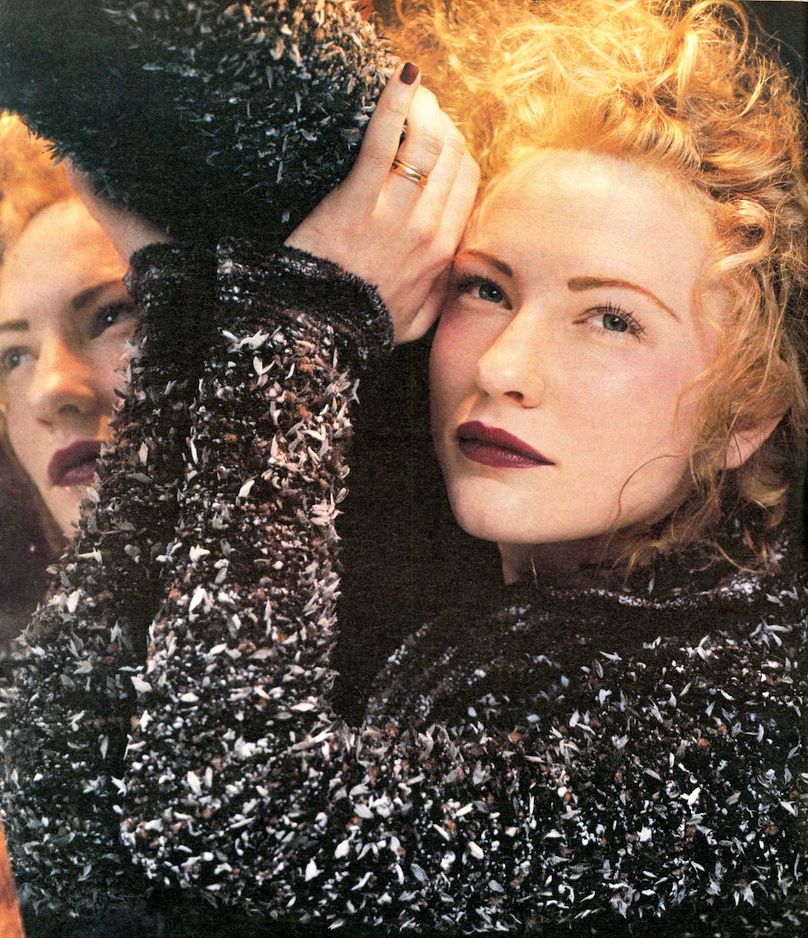
Beginning this evening, for the next 10 days, Australian actress Cate Blanchett will perform at Lincoln Center in The Sydney Theater Company’s production of The Maids. Part of the annual Lincoln Center Festival, it’s a hot ticket, to say the least; Blanchett is a universally appreciated character actress with two Oscars and a roster of past roles that includes Katharine Hepburn, Maid Marion, Bob Dylan, a celestial elf, and two queens.
The first time we spoke with Blanchett in January of 1998, a year before the release of Elizabeth and The Talented Mr. Ripley, she still was a fresh-faced, 20-something discovery with two Australian miniseries and a handful of small films to her name. We’ve reprinted the full interview below.
Cate Blanchett
By Kitty Bowe Hearty
Much like the country she comes from, the Australian actress Cate Blanchett has a fierce but far from conventional beauty. On-screen she is anchored by a still center that hints at a passionate hears, an independent mind, and a serene soul—qualities that have given a decidedly modern edge to the period characters she has so far played. They’re apparently part of her own makeup. “She was totally natural and at east with herself,” Ralph Fiennes says of his costar in this month’s Oscar and Lucinda. “She was also quietly perceptive, with a great sense of humor.”
By virtue of her own work in small but significant films, Blanchett has rapidly graduated from being a blip on casting directors’ radar screens. She was an earthy nurse in Bruce Beresford’s Paradise Road, and opposite Fiennes’s English Minister in Oscar, she plays an heiress who becomes obsessed with gambling in 1860s in Australia. She next scored a career coup by winning the role of the Virgin Queen herself in Shekhar Kapur’s Elizabeth, which she was filming in London when I called.
KITTY BOWE HEARTY: Oscar and Lucinda must seem a long way away and a long time ago for you now.
CATE BLANCHETT: Yes, I’ve been working on Elizabeth for months. We’ve got three more weeks. I’ve been incredibly homesick.
HEARTY: Where exactly is home?
BLANCHETT: Sydney, though I grew up in Melbourne.
HEARTY: Oscar and Lucinda has enormous emotional energy. I particularly remember that scene where Oscar and Lucinda are gambling for the first time on the ship. It really crackles between you.
BLANCHETT: There’s a lot of static electricity, I think, between the two characters, which is kind of different from chemistry.
HEARTY: How do you mean?
BLANCHETT: Because they don’t get along together for so long, and they’re together for such a short amount of time, which is their tragedy. It’s a corny phrase, but they were ships in the night—their hands just brushed in time. The sparks fly, but it’s like static; it’s not like the normal sexual tension that you see between lovers on-screen, which is one of the reasons I though it was such an interesting relationship. That tension had a lot to do with Gill [Oscar and Lucinda director Gillian Armstrong], who’s so specific about everything. From the beginning, if she thought something was superfluous, she would say to us, “Throw it away, throw it away, this has to be completely separate and unique.”
HEARTY: Did you still feel you were able to develop Lucinda in terms of you?
BLANCHETT: I hope so. But it’s very hard for me to judge. It was great having Peter Carey’s novel as well as the script to rely on, because it meant the internal mechanics of the character were there for me to soak up. [Carey] writes incredible, often obtuse details that you would never think of yourself. I snuck in midnight readings of the book and didn’t tell Gill. When you’re creating a character, you draw on anything. Cornflake packets…
I see Lucinda as someone who’s definitely reaching forward but there’s nowhere for her emotion to go. Peter wrote about the sensations she had sitting inside a corset, which he described as a “crinoline cage.” That’s such a metaphor for how she exists in the world: She keeps banging into things, and doesn’t know why she keeps bruising herself. She meets Oscar, who’s got no skin on his emotions and no skin on his bones—Ralph lost quite a lot of weight for that part; he was a stick insect. Really isolated people didn’t develop skin the same way that people who are more socialized do.
HEARTY: Were you nervous at the thought of working with Ralph?
BLANCHETT: I tend to have this perverse reaction to authority and stress: I become more confident and clear when a challenge is enormous. I was so completely overwhelmed at the thought of acting opposite this extraordinary actor that I wasn’t overwhelmed. When I think back, I go, How did I ever come at that?
HEARTY: They tested a lot of actresses for Lucinda. Do you know why they chose you?
BLANCHETT: I hate to disappoint you, but I don’t think I can answer. I like to think it’s because I was the right person. They certainly did look around, and it was a coveted role. You just had to mention Ralph and Gill and everybody everywhere wanted to be on that wagon. Gill was adamant about having an Australian play the character [Lucinda]. That she was able to make that demand, and realize it, shows how strong our film industry is at the moment.
HEARTY: Do you think being Australian has always been a struggle—the result of your pioneer origins?
BLANCHETT: It was completely savage back then. There were no amenities. It was when all the institutions as we know them today were still being founded. There were no precedents, and the culture was completely borrowed. You look at the topography of the place and think, How could people land here and expect to institute the same laws, the same philosophies, in a country that was so completely alien? Which is what Oscar and Lucinda explores, I think. It’s like Oscar goes into the wilderness and it eats up his whole moral code and his whole belief system—that’s what Australia did to the settlers.
HEARTY: Did you go straight from Lucinda to Elizabeth?
BLANCHETT: No, I went back to Australia and did a production of The Seagull earlier this year, and then I had some time off. That gave me a chance to reflect a little bit, which was good because time is so incredibly sped up when you’re going from film to film: You rocket into things and they rocket back at you, especially as you’re working in such a cocooned environment. When suddenly you’re let loose on the world, it’s like meeting a child you gave birth to 14 years ago and have never met. I haven’t yet come to terms with the syncopation of it all. It’s easier going onstage and getting an immediate response each night.
HEARTY: Both Paradise Road and Oscar and Lucinda are period dramas, but you made the women you played in them incredibly modern. And that, presumably, will be the real test playing Queen Elizabeth I.
BLANCHETT: There’s absolutely no point in doing a so-called period piece unless it relates to a modern sensibility. Otherwise it becomes like a BBC documentary on the way things were, and completely irrelevant, and what’s the point of doing that? We’re doing Elizabeth in the wake of Princess Diana’s death, and exploring the private recesses of self within the monarchy is completely relevant. And as in Oscar and Lucinda: Where do instinct and chance and fate sit in an increasingly rational world? If someone doesn’t fit into that, what do they do? It’s an internal question. It’s not a question specific to a period, and it’s not about what gloves I should wear when I’m playing this role—which I think is the kind of irrelevant detail a lot of period dramas get bogged down in.
HEARTY: Are you interesting working in Hollywood?
BLANCHETT: Oh, sure. It’s a question of remaining open, really. Film just chews up actors like nobody’s business, and I’m not particularly interested in being chewed up. I think the camera can only look at somebody’s face for so long. I guess you have to accept the roles you think are right at the time. You can build a career, but these days there doesn’t seem to be that much interest in people being actors. I’m sounding very holier than thou, but I sometimes think the whole thing is like one big commercial. I can’t seem to separate the ideas from the images. Maybe I shouldn’t be trying. But you do want people to remember the films you do for longer than the time it takes them to eat their popcorn.
HEARTY: My acid test is, Does a movie stay with me? Do I want to see it again?
BLANCHETT: Well, at the same time I’m going on about it, some nights I just think, I wouldn’t mid seeing a bit of crap. [laughs]
HEARTY: I’ve got to ask you about the cat in Oscar and Lucinda. It seemed to purr on cue.
BLANCHETT: That cat was one of the best actors I’ve ever worked with. We did this one shot—I’ll never forget it. I was standing outside and holding it, and then I had to put it down. The cat had to turn and look at me, and it just did it—it was unnerving. Everyone was stunned into a silence after the take. That cat should have representation.
THIS ARTICLE INTIALLY APPEARED IN THE JANUARY 1998 ISSUE OF INTERVIEW.
New Again runs every Wednesday. For more, click here.


